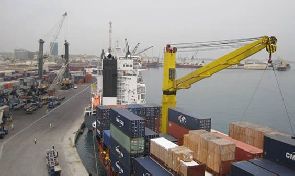Shippers who imported containerised cargo into the country for the first half of this year paid about US$ 37 million as demurrage to shipping lines for undue grounding and detention of containers after the mandatory free periods.
About GH¢19 million was also paid to the Ghana Ports and Harbours Authority (GPHA) as rent because of the inability of shippers to clear their goods from the ports after the allowable seven-day free period.
Data from the Research Monitoring and Evaluation Department of the Ghana Shippers’ Authority (GSA) has showed.
Last year, for example, shippers paid an estimated amount of US$100 million as container demurrage and rent to shipping lines operating at various ports in the country.
A situation, shippers explained contributed to the high cost of imported goods, congestion at the port, excessive loss of revenue, inefficiencies at the port and others.
Also frequent system breakdown, delays from service providers, bureaucratic operational procedures and unreliable clearing agents are some but major causes of the container demurrage at the port.
Statistics indicate that over 80 per cent of consignees are unable to clear their cargos at the port within the seven days allowable time resulting in container demurrage.
Addressing demurrage
As a measure to cut down the increasing demurrage cost, which according to industry players, is killing businesses, the shipping lines are calling for a stronger collaboration between shipping lines and importers to help address the challenges that lead to delays in cargo clearance at the ports.
The Vice-President of the Shipowners and Agents Association of Ghana (SOAAG), Mr Adam Imoru Ayarna, in an exclusive interview earlier this year with the paper, mentioned better understanding of the clearance process, the inclusion of brokers to help reduce paper work and proper sharing of documents on cargo and shipment delivery instructions with all parties as some of the strategies that were needed to help address the challenge.
A solution to delays at the ports is needed to shield companies from the brunt of rising demurrages, which have so far risen from US$40 million in 2010 to US$100 million last year.
Mr Ayarna observed that a timely clearance of cargo would also ensure that the turnaround time of shipowners and shipping lines was reduced and that could help improve their earning abilities.
While dismissing concerns from sections of the public that shipping lines were part of the problem of demurrage charges in the country, he said the shipping lines rather lost more in terms of revenue than they gained when containers delay.
To ensure commitment, he expressed the readiness of the shipping lines to help realise the government’s objective of 100 per cent paperless transactions at the ports by September this year.
He said the shipping lines have already installed cutting-edge technology to fast-track their operations to bring efficiency at the country’s seaports.
Support paperless initiative
The President of the GNCCI, Nana Appiagyei Dankawoso I, at a stakeholders’ workshop on Thursday, August 24 in Accra, said it was important for all stakeholders to support the government’s paperless initiative at the ports.
To ensure delays were addressed, there was the need for a simplification of procedures at the ports which require automation, he said that should be done taking on board the concerns of stakeholders for an effective implementation of the paperless system.
“Accurate information is very critical to the paperless system that we so much desire. The issue of un-manifested items and under-declaration should be frown upon,” he added.
The President said the government must continue deploying robust measures to address concerns of shippers, as well as to make the ports attractive to attract other landlocked countries.









